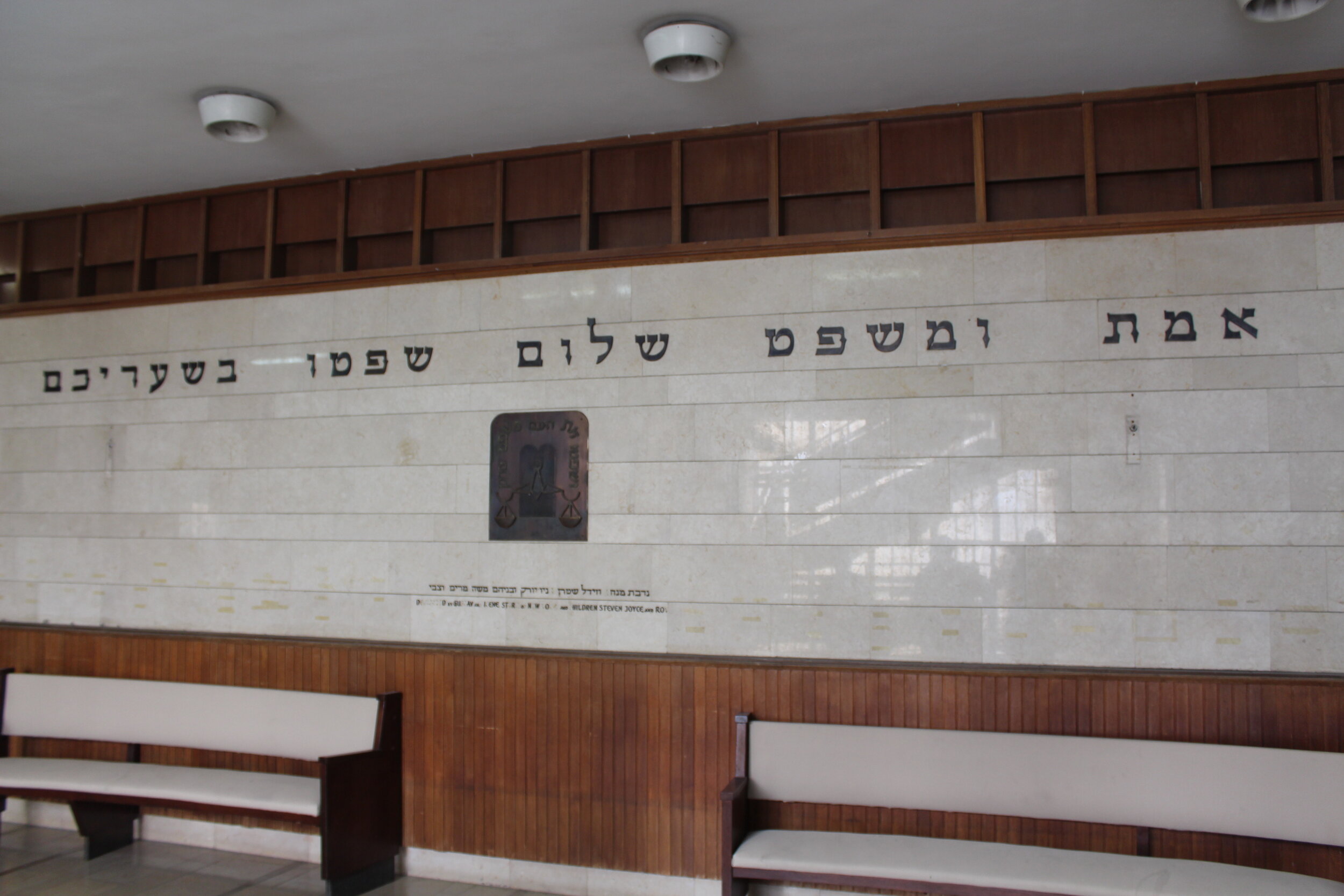Litigation in Jewish Rabbinical Courts
Many parties choose not to litigate their commercial disputes in court, but instead arbitrate their claims. And when selecting a forum for arbitration, many choose a forum that applies laws and customs that reflect their values. This is why many parties submit commercial claims to Jewish Rabbinical courts, which are called Betei Din.
To learn more about litigation in a Beth Din, I spoke with Rabbi Shlomo Weissmann, the Director of Beth Din of America.
Why should you continue reading this post about litigation in a Beth Din?
You are curious about how dispute resolution can be adapted to the needs of a cultural community and incorporate religious concepts.
You saw the episode of Law & Order where the district attorney argues a case in rabbinical court and wanted to know if that was a real thing.
You are interested in learning about a system that can resolve complex disputes in a matter of months.

Rabbi Shlomo Weissmann is the Director of Beth Din of America. This interview has been lightly edited.
Can you tell me about your background before you worked with the Beth Din?
I have worked at the Beth Din for 12 years. Before that, I was a commercial real estate attorney at Debevoise & Plimpton LLP and then at a few firms in New Jersey.
What type of disputes do Betei Din generally hear?
They range from across the board. We hear matrimonial disputes. We also hear commercial disputes, including landlord-tenant disputes, disputes arising from real estate partnerships, and disputes from other business partnerships. And we also hear employment disputes, especially involving employees of Jewish schools and synagogues, but not exclusively.
What proportion of disputes in the Beth Din are commercial disputes?
About 80%.
Must one be a lawyer or a rabbi to represent a client in a Beth Din?
In the Beth Din of America, you must be a licensed attorney to represent a client. But litigants can appear without a lawyer pro se.
Other rabbinical courts differ and allow rabbinical advocates and non lawyers.
The Beth Din of America does not for Jewish law reasons and because non-lawyers are not bound by ethical rules, so we stay away from that.
Is there any requirement that lawyers who argue before a Beth Din be practicing Jews?
No. Any lawyer can represent a client in a Beth Din. Jew, non-Jew, man, woman, observant, or non-observant.
How often do non-Jews participate?
It is somewhat rare for litigants in Betei Din to be non-Jews, but there have been a few in cases over the years. I can recall two such cases.
There are non-Jewish lawyers who regularly argue in Betei Din.
Do the judges in a Beth Din receive special legal training?
Yes. Typically, they have advanced rabbinic ordination, beyond the standard for a typical rabbi, in which they train for commercial disputes.
In our Beth Din, we usually convene a panel of three arbitrators. And we mix up a panel of experts in Jewish law and subject matter experts. So in child custody case, we will include a mental health professional. In a commercial dispute, we will include a lawyer.
How often do parties appear pro se without an attorney before Betei Din?
In cases over a few hundred dollars, parties rarely appear with an attorney. But for larger cases, about 80% of the time parties have lawyers.
Is there any special attire for participants in a Beth Din?
No. People wear business suits and ties.

Do litigants electronically file pleadings with the Beth Din?
When a toveah (a plaintiff) makes their initial application, they file it on our website.
But we don’t really have an e-filing website like courts do for subsequent filings. Those are made by e-mail.
Are the decisions of Beis Din published or are they kept confidential?
We would like to publish them, but they are confidential.
Now we ask litigants if they consent to publication of the decisions. More often than not they do not, even if we offer to anonymize them. But we have twelve reported decisions on our website.
Do Betei Din Hear Appeals?
Typically under Jewish law there aren’t really appeals
But under our procedure, we introduced an appeal system you can make a request for modification. That goes to the Av Beth Din, chief rabbinate judge, who delegates it to another Beth Din leader.
Do parties in a dispute before a Beth Din file pre-trial motions, like in a secular court?
Once a case is in front of us, and we have jurisdiction, less complex cases go straight to the arbitrators without additional filings.
If the case is more complex, we will work with the parties to arrange a pre-hearing exchange of briefs to let the arbitrators know what the case is about.
But there is a process that involves filings. Often we have cases without a contract with a binding arbitration provision. In those cases, if one Jew wants to summon another Jew to the Beth Din, they can open case and they send a summons, called a Hazmana. The recipient can then do one of the following:
File an argument in which they argue there is no justiciable controversy, for example when there is already a release.
Agree to proceed in the Beth Din.
Stay in secular court, which may result in the Beth Din sending a letter of community sanctions, criticizing the recipient for not participating in the Beth Din.
Consent to proceed in a Beth Din, but request that a different Beth Din hear the dispute. If there is no agreement between the parties on a single Beth Din, this leads to a process called ZABLA, where each side chooses an arbitrator, and those two arbitrators select a third arbitrator.
What law governs disputes in a Beth Din?
For all of the disputes we handle, Jewish law is the starting point that governs. But Jewish law very often looks to local commercial custom and sometimes even to local law, which it may integrate.
So if there is a governing law provision in a contract, Jewish law will respect that. And even if there is not a governing law provision, if the judges assess that the intent of the parties was to follow local law, they will take that into account.
Besides the Torah, are there any other legal authorities cited in Beth Din proceedings?
Jewish law is vast complex corpus of law. It is not just the five Books of Moses. It is a developed body of law that has developed over centuries.
It includes a code of Jewish law that developed in the 1500s. And it includes literature and treatises that summarize and report on the law that has developed. Unlike American law, it is not based on case decisions.
The primary texts are mostly in Hebrew. They include the Talmud, which was written around 900, and the Shulchan Aruch, a compilation of rulings from the Talmud.
The law also includes the Responsa Literature, which are a series of questions and answers posted to rabbinic authorities in the Middle Ages.
And it includes modern treatises. I think the best one is Pitchei Choshen by Rabbi Yeshaya Blau from Jerusalem in the 1980s. It is a magnificent compilation of everything in Jewish law.
Are there rules of evidence that dictate what evidence is admissible in a Beth Din?
Not really. Jewish law governs at a Beth Din, and it does not have specific rules of evidence. We make judgment calls as the case may be.
Are the submissions and decisions written in English or Hebrew?
They are in English.
Generally speaking, how many pages are the complaints or initial pleadings you see in your work?
Only a few paragraphs.
But the judges will often work with the parties at their comfort level to make sure they understand the claims and defenses asserted. In one recent case, for example, the judges asked for 2-3 page summaries of the parties’ positions.
Do defendants need to file answers?
A Nitba (defendant) doesn’t need to. But they can file one to raise counterclaims or an affirmative defense.
Generally speaking, how long does it take for a case to go from the parties agreeing to litigate in a Beth Din to judgment?
From the time the parties agree to proceed in a Beth Din to a judgment, cases take on average 4-6 months.
They sometimes go faster. For a small claim heard by just one arbitrator, the case can be done in 2 weeks.
More complicated cases may take an additional month or two for the panel to write their decision.
Do disputes in a Beth Din have pre-trial discovery where the parties are required to exchange evidence or interview opposing witnesses?
Just like in commercial arbitration, it depends on the case.
The process in a Beth Din is more streamlined than in secular court. In many cases, you can get by without loading the other side with interrogatories and document demands. And an arbitrator can get to the bottom of a case without the parties drowning in discovery.
So we discourage “over-lawyering” in discovery demands as much as possible. If the matter is a small dispute, or the parties are unrepresented by lawyers, we can do things less formally.
But some cases are more complex and, in those cases, it is important to see the paper trail. So parties may be compelled to produce documents as appropriate.
Do the parties get to interview opposing witnesses before the hearing?
Typically there are no depositions. But in a complex case they may be appropriate. Jewish law generally prefers that testimony be given in the presence of the arbitrators hearing the case.
Sometimes, however, a case has first proceeded in court and the parties agreed at the last minute to switch to a Beth Din. In that case, we will take advantage of depositions that have already taken place.
Do prevailing parties recover attorney’s fees?
Jewish law for the most part follows the American rule on this issue, so litigants do not recover attorneys’ fees unless they agreed to by contract.
Do you believe that Betei Din have a particular strength for resolving commercial disputes?
I do, especially in the sense that they have cultural familiarity with the litigants. In matrimonial cases, that familiarity is important.
In some commercial cases, like employment cases with schools, our rabbis’ familiarity with the culture is important. And there are many situations in disputes where pure Jewish law applies and Beth Din judges have the competence to decide that in a way that secular courts don’t.
And it’s a comfortable and familiar setting for people. For some people, courts are not the place you want to be. Some people feel more comfortable around people from their own community. you want to be somewhere more comfortable.
And all the other arguments for arbitration - it’s cheaper and less adversarial.
How about a weakness?
None come to mind at the moment.
Sometimes people push back on Beth Din dispute resolution because they think they would have more tools at their disposal in secular court, like discovery. But even if you arbitrate in a Beth Din, under court rules like the CPLR, participants in a Beth Din dispute can compel the production of documents from third parties.
Does one entity organize or set rules for all Betei Din, or do different communities operate them independently?
It is kind of like the wild west; anyone can set up their own rabbinical court. Each one has its own reputation, some are good and some not as good. There is no hierarchy; each rabbinic court sets their own internal policies.
Beth Din of America is the largest and probably the busiest.
Some communities and regions have their own Beth Din. For example, Baltimore, Chicago, and Los Angeles have ones.
